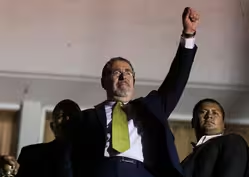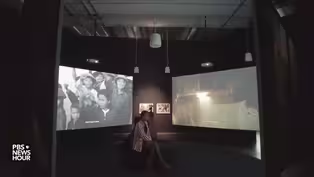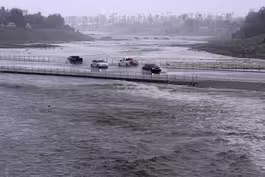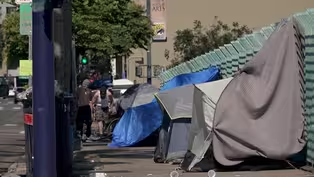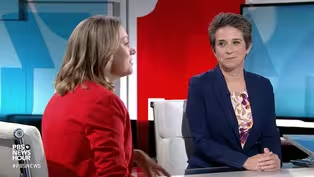
Questions and anger emerge over Maui wildfire response
Clip: 8/21/2023 | 6m 28sVideo has Closed Captions
Questions and anger emerge over Maui wildfire response and lack of communication
Local officials and residents are still assessing the scope of loss from the Maui wildfires. Troubling questions and anger have emerged as well about the role of Hawaii's biggest power utility, the response by local and state government and a lack of critical communication when residents most needed it. Geoff Bennett discussed that perspective with Marina Riker of Honolulu Civil Beat.
Problems playing video? | Closed Captioning Feedback
Problems playing video? | Closed Captioning Feedback
Major corporate funding for the PBS News Hour is provided by BDO, BNSF, Consumer Cellular, American Cruise Lines, and Raymond James. Funding for the PBS NewsHour Weekend is provided by...

Questions and anger emerge over Maui wildfire response
Clip: 8/21/2023 | 6m 28sVideo has Closed Captions
Local officials and residents are still assessing the scope of loss from the Maui wildfires. Troubling questions and anger have emerged as well about the role of Hawaii's biggest power utility, the response by local and state government and a lack of critical communication when residents most needed it. Geoff Bennett discussed that perspective with Marina Riker of Honolulu Civil Beat.
Problems playing video? | Closed Captioning Feedback
How to Watch PBS News Hour
PBS News Hour is available to stream on pbs.org and the free PBS App, available on iPhone, Apple TV, Android TV, Android smartphones, Amazon Fire TV, Amazon Fire Tablet, Roku, Samsung Smart TV, and Vizio.
Providing Support for PBS.org
Learn Moreabout PBS online sponsorshipGEOFF BENNETT: As President Biden surveys the damage in Maui, emergency crews, local officials, and residents are still assessing the scope of loss from the wildfires.
So far, officials have confirmed that the fires led to more than 110 deaths, and most of those individuals have yet to be identified.
More than 1,000 federal officials remain on the ground.
Troubling questions and anger have emerged as well about the role of Hawaii's biggest power utility, the response by local and state government, and a lack of critical communication when residents most needed it.
For the latest on what that perspective is like on the ground, we're joined by Marina Riker, a reporter for The Honolulu Civil Beat, who is based in Maui.
Thank you for being with us.
MARINA RIKER, The Honolulu Civil Beat: And thank you so much for having me.
GEOFF BENNETT: And we should say that, as you are covering the aftermath of these wildfires, you were also directly affected by it.
The rental home where you were living was consumed by the fires.
You shared this before-and-after photo with our team.
Tell us what this experience sense has been like for you.
MARINA RIKER: Yes, so I would say I actually -- mostly, I have been dealing with my own home and disaster and, whenever I can, trying to work on the side, because it's been extraordinarily chaotic.
But, yes, my home burned down in Kula, which was one of a couple of wildfires that broke out on August 8.
GEOFF BENNETT: The day of the fires, how were you able to evacuate?
MARINA RIKER: A separate fire from the one that took my house actually broke out a few miles away from me earlier that morning, so we were already on edge, because this sort of a thing has not happened, at least in my lifetime growing up here.
I don't remember anything like this ever happening.
So we were already on edge.
We were preparing our go bag.
We have three cats.
We decided to catch them and put them into carriers.
And, sure enough, around -- we think around noon that day, a fire broke out about two properties over from us.
And in the hours that followed, the smoke was so bad.
And then we saw flames.
So that's when we just we made to get -- we made the call to get out before an evacuation -- an evacuation order had been issued.
GEOFF BENNETT: And, as I understand it, you were denied FEMA assistance at first, which is remarkable, really, given that you're someone who knows how to navigate the system.
Tell me more about that and what folks there are coping with.
MARINA RIKER: As someone who has had to actually cover natural disasters in the past and actually write about FEMA and other relief programs, I think the big thing that I have realized as someone who, yes, also lost their home, it's not like government officials are directly reaching out to you to give you this information.
You have to find it yourself.
You have to try to figure out, what do you do with the home debris?
How do you apply for FEMA?
What Web sites do you go to?
What other relief programs are there?
So, I mean, in the case of FEMA -- and this is going to happen, I mean, at rental properties all over -- all over Maui -- because my landlord had already submitted an application for damage, then, when I went to submit one online, it was denied, because it's the same address.
So, fortunately, I was able to troubleshoot and call someone.
But it's been super confusing.
GEOFF BENNETT: As you well know, there are major questions about the cause of the wildfire, the electric utility's role in them, questions about why officials didn't sound the alert system, concerns about how residents were cut off from cell service?
Generally speaking, what do residents want to see in terms of accountability?
MARINA RIKER: There's so much.
I think the big question -- and, I mean, that was just my own question as a resident going through this -- was, I mean, when our home burned down, cell phone reception was so limited that I don't know if there was an emergency alert sent.
We didn't get one.
There was -- I did see a news release later that afternoon.
But I think it's just folks want to see better communication, of course, and these disasters, in hopes it saves lives.
But then also, in the rebuilding, like, they want to see communities lead these efforts.
And what the community that I'm from in Kula needs is going to be totally different than what the community in Lahaina needs.
So this -- I think everyone just wants to make sure that residents are not left out and that residents take the lead in rebuilding these communities.
GEOFF BENNETT: Speaking of rebuilding, the governor there says it will take years and billions of dollars.
What does the future look like for folks in Maui?
MARINA RIKER: The one positive thing in all this is, I can't even begin to say how much support we have seen just even from our own neighbors.
And, I mean, communities are really coming together, I think, to lead the charge in the rebuilding efforts.
But, yes, this is -- I mean, it's absolutely devastating.
There aren't even really -- I mean, and devastating just feels like such a small word to describe the magnitude of this.
There's just the deadliest disaster we have had in Hawaii and the deadliest wildfire in modern history in the U.S.
So it's going to be very slow.
But I think the big point is, we want to see communities lead the rebuild, and have them -- have their voices heard in that process of how we're going to recover from this.
GEOFF BENNETT: To the extent that you have been able to focus on your work, do you have a sense of where that reporting will head next in the work that you do for The Civil Beat?
MARINA RIKER: Well, so, it's really interesting, because I actually worked as a reporter in Texas when Hurricane Harvey hit.
And I had very minor home damage, but nothing - - not like this, where my home is leveled, and I have nothing, and I had to try to go rebuy some toiletries, because I just don't have anything anymore.
And I think, for me, it's changed the way I see reporting in terms of the information that I need, as someone who's lost my home, is totally different than the information that the general public might need.
So, for me, I mean, I'm hoping that that will help me out ask better questions and figure out what we're -- what we actually need in terms of information to, like, help the families going through this.
GEOFF BENNETT: Marina Riker, thanks so much for your time.
And our thoughts are with you and everyone affected by these wildfires.
MARINA RIKER: Thank you.
Anti-corruption outsider triumphs in Guatemala election
Video has Closed Captions
Clip: 8/21/2023 | 7m 49s | How an anti-corruption outsider triumphed in Guatemala's presidential election (7m 49s)
Artist examines legacy of Vietnam War and impact on his life
Video has Closed Captions
Clip: 8/21/2023 | 6m 24s | Artist examines legacy of Vietnam War and its impact on his own life in new exhibition (6m 24s)
California cleaning up after first tropical storm in decades
Video has Closed Captions
Clip: 8/21/2023 | 2m 54s | Southern California begins cleaning up after first tropical storm in 8 decades (2m 54s)
Costly weight loss drug may also cut risks of heart attacks
Video has Closed Captions
Clip: 8/21/2023 | 7m 5s | Study shows costly weight loss drug may also cut risks of heart attacks (7m 5s)
States confront mental health crisis with coerced treatment
Video has Closed Captions
Clip: 8/21/2023 | 9m 45s | States look to involuntarily hospitalize people to confront growing mental health crisis (9m 45s)
Tamara Keith and Amy Walter on Trump skipping 1st GOP debate
Video has Closed Captions
Clip: 8/21/2023 | 8m 30s | Tamara Keith and Amy Walter on 1st GOP debate and Trump's plan to skip it (8m 30s)
Providing Support for PBS.org
Learn Moreabout PBS online sponsorship
- News and Public Affairs

FRONTLINE is investigative journalism that questions, explains and changes our world.

- News and Public Affairs

Amanpour and Company features conversations with leaders and decision makers.












Support for PBS provided by:
Major corporate funding for the PBS News Hour is provided by BDO, BNSF, Consumer Cellular, American Cruise Lines, and Raymond James. Funding for the PBS NewsHour Weekend is provided by...
